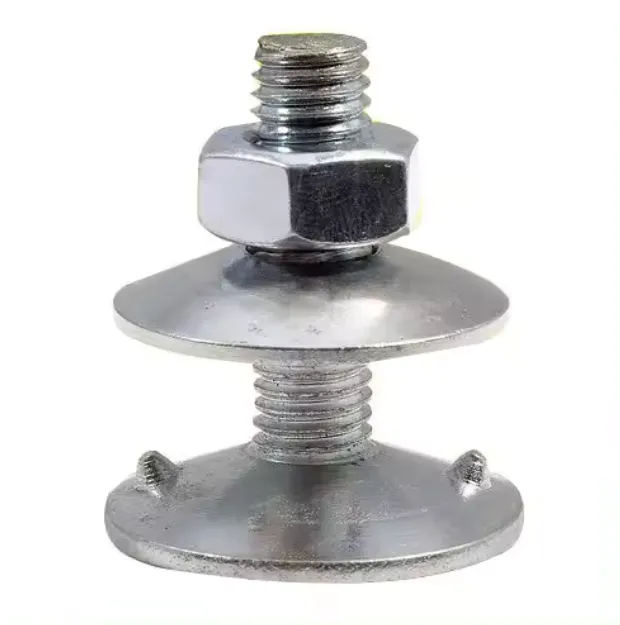

Choosing the Right M6 Lock Washers for Your Projects and Applications
अक्टूबर . 16, 2024 15:16 Back to list
Choosing the Right M6 Lock Washers for Your Projects and Applications
Understanding Lock Washers A Focus on M6 Size
Lock washers are critical components in mechanical assemblies, providing reliability and stability in the fastening process. Among the various types of fasteners, the M6 lock washer holds a significant place due to its unique features and applications. In this article, we will explore the importance of M6 lock washers, their types, material choices, and best practices for usage.
What is an M6 Lock Washer?
M6 refers to a specific size of screw or bolt that has a nominal diameter of 6 millimeters. Lock washers are used in conjunction with these fasteners to prevent loosening due to vibration, thermal expansion, and other mechanical factors. The design of a lock washer introduces extra friction, which helps maintain the tightness of the assembled parts.
Types of M6 Lock Washers
There are several types of lock washers that cater to different applications and environments. The most common types include
1. Split Lock Washers These are circular springs that are cut in the shape of a split. When the bolt is tightened, the split closes, exerting a gripping force against the surface of the assembly. This type is commonly used in machinery and automotive applications due to its effectiveness at preventing loosening.
2. Tooth Lock Washers These washers have sharp teeth that dig into the surface of the material being fastened. Tooth lock washers can be further divided into internal and external types, depending on the direction the teeth face. They provide a stronger grip, making them suitable for heavy machinery and applications where high torque is involved.
3. Belleville Washers Often referred to as conical washers, these are particularly useful in applications needing a controlled preload and flexibility. The conical shape allows for deflection under load, which helps absorb shocks and vibrations, thus maintaining tension over time.
Materials Used in M6 Lock Washers
The choice of material for lock washers is vital for their performance. Common materials include
lock washer m6

- Carbon Steel This is the most widely used material for lock washers, offering good strength and ductility at a relatively low cost. However, they are susceptible to corrosion without appropriate coatings.
- Stainless Steel Known for its resistance to corrosion and high temperatures, stainless steel lock washers are ideal for applications in harsh environments, such as marine or chemical applications.
- Plastic Sometimes used for lighter-duty applications, plastic lock washers can be useful in environments where metal may cause short circuits in electronic components.
Best Practices for Using M6 Lock Washers
To ensure that M6 lock washers perform optimally, it is important to follow best practices
1. Surface Preparation Clean the surfaces to be fastened. Any dirt, rust, or oil can reduce the effectiveness of the lock washer.
2. Correct Installation Place the lock washer between the nut or bolt head and the assembly surface. Ensure that it sits flat and that it is not distorted during the tightening process.
3. Proper Torque Specifications Always adhere to the manufacturer’s torque specifications when fastening. Over-tightening can lead to permanent deformation of the lock washer, diminishing its effectiveness.
4. Periodic Inspection Regularly check fastened assemblies for signs of loosening or wear. In high-vibration environments, intervals for inspection may need to be shorter.
Conclusion
M6 lock washers play a pivotal role in ensuring the integrity of bolted connections across various applications. Understanding their types, materials, and proper usage can significantly enhance the reliability of mechanical assemblies. Whether in automotive applications, machinery, or construction, the correct use of M6 lock washers can prevent failures due to loosening and prolong the life of the assembled components. As with any mechanical component, knowledge and diligence in application can yield significant benefits in performance and safety.
Latest news
-
Hot Dip Galvanized Bolts-About LongZe|High Strength, Corrosion Resistance
NewsJul.30,2025
-
High-Strength Hot Dip Galvanized Bolts - Hebei Longze | Corrosion Resistance, Customization
NewsJul.30,2025
-
Hot Dip Galvanized Bolts-Hebei Longze|Corrosion Resistance&High Strength
NewsJul.30,2025
-
High-Strength Hot-Dip Galvanized Bolts-Hebei Longze|Corrosion Resistance&High Strength
NewsJul.30,2025
-
Hot Dip Galvanized Bolts-Hebei Longze|Corrosion Resistance&High Strength
NewsJul.30,2025
-
Hot Dip Galvanized Bolts - Hebei Longze | Corrosion Resistance, High Strength
NewsJul.30,2025

